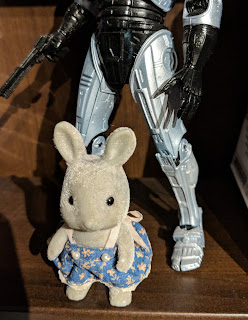Anne of Green Gables

Anne of Green Gables
1908, Lucy Maud Montgomery
1908, Lucy Maud Montgomery
I'm surprised how much I remember about a book, that to my recollection, I have never read before. I was quite young when the acclaimed 1985 TV movie came out, but I remember seeing bits of it over the years. My mom really liked the spin-off series, Avonlea (Road to Avonlea outside the US), and we watched it together when I was younger. A few weeks ago I might not have been able to rattle off character names, but could have given you the most iconic scenes off the top of my head (Lily Maid boat ride, and ridgepole walk).
So reading through the actual text has been less like hearing a new story, and more like rediscovering a story I always knew. This sense is helped along by the feeling that I should have read, and loved, this book as a child. Overall I love the story, the style of writing, the sly understated humor.
The writing occasionally lapses into omniscient narrator syndrome, which is striking only because most of it just follows the characters from their perspectives. There is no moralizing, just what one or another character thinks and does. Anne is certainly of the opinion that it is hard to be good, and no mater how she tries, she's dreadfully wicked. After all, adults keep telling her so.
Anne soaks up everything around her. She wants the latest fashions, laments her hair color, understands "good" behavior, and even though she is very smart, she only slowly learns that she can't trust everything she hears from adults.
I do find in Anne, as she says, a 'kindred spirit', and it makes me all the sadder that it took me so long to really meet her. I had a friend in grade school who loved this book, and from her I learned the meaning of "bosom friend" and the romance of Anne's trip down the river as the lily maid.
Growing up is a central chord in Anne of Green Gables, and I wonder if reading it as a young girl, I might have gloried along with Anne in her growing up. She becomes less flighty, more driven, happier and more mellow, and gains the approval of her peers. Reading it now, one of the things I feel in those scenes is the sense of loss, when Anne muses that once you're old enough to wear your hair up, own fashionable dresses or sleep in guest rooms, it never seems as exciting as you thought it would be. That's not to say that there aren't more adult pleasures to be had, only that they are different, and there is no going back.
About the end: I'm not sure that I would have understood it as a child. The idea that Anne would give up her ambition, alter her career path, to help Marilla, may have seemed weird to young me, reader mostly of "epic destiny" style books. Or I may have seen it through the "romance" of the earlier parts of the book. It's terribly romantic to imagine yourself as Cinderella when all you really have to do is clean your room. However, the contrast between the her early romantic ideas of being a martyr, and the simple choice Anne makes to help support her adoptive mother is strong. She takes a temporary step back from one potential ambition, to seek one closer to home. (If you read the further books, she does eventually get off to college as she wished.)
In all, a beautiful meditation on friends, loving life and the glories of each day.
4 Stars - A Really Good Book


Comments
Post a Comment
FYI: Most comments are moderated, and will not appear immediately.